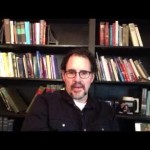We run our website the way we wished the whole internet worked: we provide high quality original content with no ads. We are funded solely by your direct support. Please consider supporting this project.
The Future of Theology
Chris Moore via Compfight
Roger Olson recently published a blog arguing that there really are no new ideas out there in the realm of theology. Everything has pretty much been thought of or proposed. That idea or book that’s causing such a stir? Rewarmed material that someone else already thought of.
So what is there left for theology to do?
Roger wrote a follow-up article that answers this question. He notes that many of the old ideas have had problems in the way the were articulated, and modern theologians have refined them or presented them in ways that solved these problems. For example:
When Gottfried Thomasius (d. 1875) proposed what came to be called “kenotic Christology” it was fraught with problems and widely rejected as seriously harming the doctrine of God if not the deity of Christ. However, English kenotic theologians such as Peter Taylor Forsyth (d. 1921) fixed those problems (e.g., in the Person and Work of Jesus Christ).
When so-called “open theism” first appeared among evangelicals in the late 20th century it had some serious defects. What was called open theism had been proposed before and those defects had hindered its acceptance by many sympathetic people. Greg Boyd, however, re-articulated open theism in a way that made it more acceptable because, as he articulates it, it isn’t about any limitation of God but about the future.
As to the future of theology, he goes on to say:
So what does the future of Christian theology look like? It will continue to perform its critical tasks. It will continue to explore traditional ideas/doctrines/models of God and attempt to make fruitful ones more intelligible and acceptable to faithful people of God. And it will attempt to find new ways to express traditional ideas/doctrines/models of God such as the Trinity so that they are understandable by contemporary people in many different culture.
We’re grateful here at ReKnew to be a part of this work.
Category: General
Tags: Kenosis, Open Theism, Roger Olson, Theology, Trinity
Related Reading

What is the significance of 1 Samuel 15:10?
In light of Saul’s sin the Lord says, “I regret that I made Saul king, for he has turned back from following me.” Common sense would suggest that one can only regret a decision one makes if the decision results in an outcome other than what was expected or hoped for. If God foreknows all…

Why do you espouse Open Theism?
Open Theism refers to the belief that God created a world in which possibilities are real. It contrasts with Classical Theism which holds that all the facts of world history are eternally settled, either by God willing them so (as in Calvinism) or simply in God’s knowledge (as in Arminianism). Open Theists believe God created…

Free Will: Are studies that demonstrate genetic determinism a threat to free will?
Greg shares his continuing thoughts on free will with a thought experiment (and a hand-drawn graph!) granting that we are largely determined by forces outside of our control. If we grant this presupposition, does that mean that free will is an illusion or insignificant? Find out!

What is the significance of Jeremiah 42:9-16?
Through Jeremiah the Lord tells Israel “If you stay in this land, I will build you up and not tear you down; I will plant you and not uproot you, for I have relented concerning the disaster I have inflicted on you” (vs. 10). Then, a few verses later, he says, “However, if you say,…

How do you respond to Acts 2:23 and 4:28?
Question: Acts 2:23 and 4:28 tell us that wicked people crucified Jesus just as God predestined them to do. If this wicked act could be predestined, why couldn’t every other wicked act be predestined? Doesn’t this refute your theory that human acts can’t be free if they are either predestined or foreknown? Answer: In Acts…

What is the significance of Ezekiel 33:13–15?
“[W]hen I say to the righteous he will surely live, and he so trusts in his righteousness that he commits iniquity, none of his righteous deeds will be remembered…he will die. But when I say to the wicked, ‘You shall surely die,’ and he turns from his sin and practices justice and righteousness, if a…

